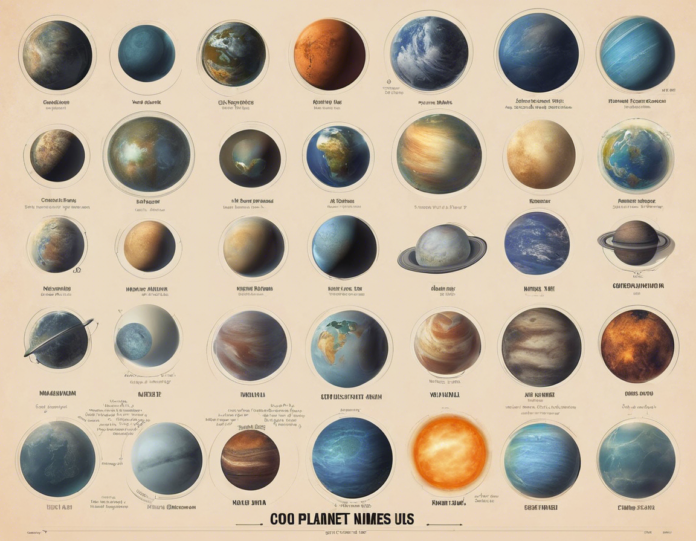Have you ever looked up at the night sky and wondered about the countless planets scattered throughout the universe, each with its own unique name and story? The discovery of exoplanets in recent years has unveiled a myriad of intriguing names that not only reflect their scientific significance but also delve into mythology, literature, and even pop culture. Join me on a journey through the cosmos as we explore some of the fascinating planet names that have captivated astronomers and stargazers alike.
The Art of Naming Planets
Before we delve into specific planet names, it’s essential to understand how these celestial bodies are named. The International Astronomical Union (IAU) is the governing body responsible for assigning names to planets and other astronomical objects. The process involves adhering to certain guidelines and criteria to ensure consistency and accuracy in nomenclature. In many cases, exoplanets are designated with a combination of letters and numbers based on their host star, such as HD 209458 b or GJ 1214 b.
Intriguing Planet Names
-
Kepler-186f – Dubbed the “Earth’s Cousin,” Kepler-186f is a planet orbiting within the habitable zone of its star, Kepler-186. The name signifies its discovery by the Kepler space telescope and is part of a system of five planets.
-
TrES-2b – Known as the “Dark Knight” exoplanet, TrES-2b is one of the darkest planets ever discovered, reflecting less than 1% of the sunlight it receives. This intriguing name captures its mysterious and shadowy nature.
Mythological References
Many planet names draw inspiration from mythology, intertwining ancient tales with cutting-edge scientific discoveries.
-
Elysium Planitia – This vast plain on Mars, explored by NASA’s InSight mission, derives its name from Greek mythology. Elysium was the paradise where heroes and the virtuous would reside in the afterlife.
-
Proxima Centauri b – The closest known exoplanet to Earth, Proxima Centauri b orbits the star Proxima Centauri in the Alpha Centauri system. The name “Proxima” refers to its proximity to Earth, while the “b” signifies its status as the first known planet in the system.
Literary Inspirations
-
Pandora – Named after the mythical figure from Greek mythology, Pandora is one of Saturn’s moons. This name evokes curiosity and wonder, much like the mythical Pandora’s box.
-
Calypso – Another of Saturn’s moons, Calypso is named after the sea nymph in Homer’s “Odyssey.” The name conjures images of enchantment and beauty.
Pop Culture Phenomena
-
Tatooine – Star Wars fans will recognize this name as the desert planet where Luke Skywalker grew up. In real life, Tatooine is an exoplanet orbiting two suns, reminiscent of the iconic binary sunset scene from the films.
-
Vulcan – Popularized by the “Star Trek” franchise, Vulcan is a hypothetical planet that was once believed to orbit within the orbit of Mercury. Though the real Vulcan does not exist, the name has captured the imagination of sci-fi enthusiasts.
Frequently Asked Questions (FAQs)
-
How are exoplanets named?
Exoplanets are typically named following a specific format that includes the host star’s name or designation, followed by a lowercase letter (e.g., b, c) indicating the planet’s position. -
Can individuals suggest names for exoplanets?
The IAU oversees the naming of astronomical objects and does not accept individual suggestions for exoplanet names. Naming conventions are based on scientific criteria and guidelines. -
Do exoplanet names have any significance beyond identification?
While exoplanet names primarily serve as identifiers, they can also reflect characteristics or properties of the planet, pay homage to cultural or mythological references, or honor significant figures in astronomy. -
Are there specific rules for naming exoplanets after fictional or pop culture references?
The IAU encourages creativity and diversity in naming exoplanets but emphasizes the importance of maintaining scientific integrity and avoiding misleading or inappropriate names. -
Can exoplanet names change over time?
In some cases, exoplanet names may be revised or updated based on new discoveries, reevaluations of data, or a desire to align with updated naming conventions. Such changes help ensure clarity and accuracy in astronomical nomenclature.
In conclusion, exploring the diverse array of planet names in the universe unveils a rich tapestry of creativity, symbolism, and cultural references that capture the imagination and spark curiosity about the vast cosmos. Whether inspired by mythology, literature, or pop culture, these names serve as a testament to humanity’s enduring fascination with the mysteries of the cosmos and our quest to unravel the secrets of the universe.





